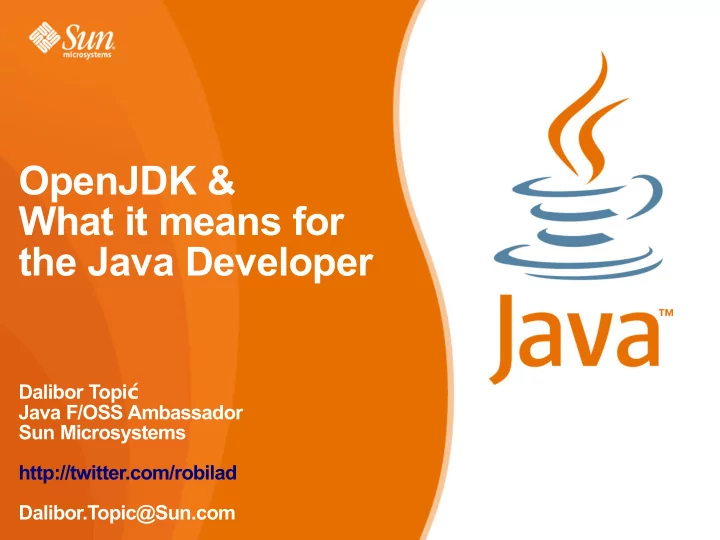

OpenJDK & What it means for the Java Developer Dalibor Topi ć Java F/OSS Ambassador Sun Microsystems http://twitter.com/robilad Dalibor.Topic@Sun.com
Java 2
Programming Language 3
Virtual Machine 4
Cross- platform Programming Environment 5
Community Of Communities 6
Pretty successful 7
~1B LOC of Open Source Code written in it (acc. to ohloh.net) 8
That's just the visible space 9
What else happened in the last 10 years? 10
Open Source 11
From fringe to mainstream 12
Open Innovation across organizational boundaries 13
Remember shipping containers? 14
Changed the world 15
Radically reduced transaction costs 16
For material goods 17
Standardized measures 18
Optimization opportunities 19
Open Source does the same 20
For software components 21
Standardized Legal Containers 22
Permeable development 23
Lowered barrier to participation 24
Collaborative User Innovation 25
What else happened? 26
Linux 27
From fringe to mainstream 28
Cloud, Cluster, Server, Netbook, TV, Phone, ... 29
Anyone can create a Linux- based software platform 30
shipping yard, fleet & port in one 31
Organic growth 32
Cambrian explosion of Linux distros 33
Selective Pressure On Development Tools on Linux Strongly Favors Open Source 34
Manifests itself around: availability, integration, ease of use 35
Example: sudo aptitude install openjdk-6-jdk vs. many minutes of manual work 36
Example: sudo aptitude build-dep openjdk-6 vs. many hours of manual work 37
Open Source + Java + Linux 38
39
OpenJDK 7 40
JDK 7 41
Open Source 42
GPL v2 43
Classpath Exception 44
2006: From closed to open 45
First Step: Get the code out 46
Putting the effort in perspective 47
Mozilla 1.2M SLOCs 48
Eclipse 2.2M SLOCs 49
OpenJDK 3.5M SLOCs 50
Done within one year 51
Managing expectations 52
Pessimist extremists: Java will be forked to death! 53
Well, no. Didn't happen. 54
Optimist extremists: I want a feature! And I want it now! 55
Well, probably no. You can have a go at it yourself, though. 56
Culture change 57
2007: Cleaning up 58
Second Step: 100 % Open Source 59
Replacing encumbered third-party code 60
Removing structural barriers to innovation 61
Fully open source bootstrap 62
IcedTea 63
Gervill Sound Synthesizer 64
64-Bit Plugin 65
Packaging 66
OpenJDK 6 67
2008: Infrastructure & Adoption 68
Third Step: Put it to use 69
Mercurial 70
External Committers 71
JDK 7 mainline 72
Sidestreams of development 73
Feature Projects 74
Like NIO2, MLVM & Jigsaw 75
Making JDK & JVM suitable for more problems 76
Porting Projects 77
Like Zero, Shark, BSD Port 78
Putting OpenJDK in more places 79
Gentoo, Debian, Fedora, Ubuntu, OpenSUSE, Mandriva, Simply MEPIS, Linux Mint Red Hat Enterprise Linux, CentOS, Oracle Enterprise Linux FreeBSD, OpenBSD, NetBSD, MacPorts Poky Linux, Angstrom, OLPC XO 80
Removing social barriers to innovation 81
2009: JDK 7 Milestones 82
Fourth step: Create more opportunities to innovate 83
Code going from closed to open often has a tough learning curve 84
Private conversations 85
Insider knowledge 86
Easier to learn the ropes writing new code 87
Public knowledge 88
Searchable knowledge 89
In practice: Modularize the code base 90
Reducing complexity 91
Removing intrinsic barriers to innovation 92
Where are we now? 93
Gradually growing, diverse Community 94
Individual Developers 95
BSD Port Landon Fuller Greg Lewis Kurt Miller Christos Zoulas 96
Academia 97
Type Annotations Mahmood Ali Michael Ernst 98
Corporate Contributors 99
Sun, Red Hat, Google, AMD 100
Recommend
More recommend